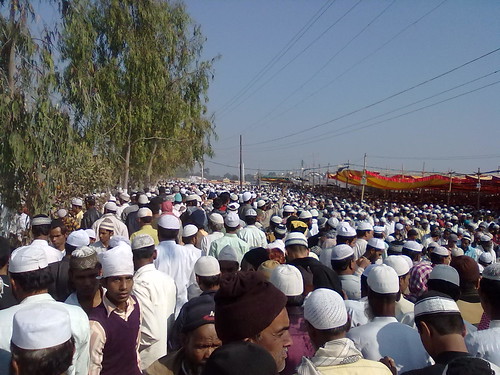By Pervez Bari, TwoCircles.net,
Bhopal: The three-day 63rd edition of “Aalami Tablighi Ijtima” (World Preachers’ Congregation) came to conclusion on Monday afternoon after the mass “Dua” (seeking blessings from the Almighty) with several lakhs of Muslims participating in it from all corners of the
world.
The venue of the Ijtima on the outskirts of Bhopal at Ghasipura in Eintkhedi village in the Central Indian state of Madhya Pradesh, reverberated with “Ameen” (Amen) continuously during the 40 minutes of the “Dua”. Maulana Sa’ad-ul-Hasan of Nizamuddin Markaz (headquarters), New Delhi, who conducted the “Dua” in a mixture of Arabic, Urdu and Hindi languages, repeatedly pleaded to the Almighty Allah for the Muslim Ummah and humanity at large, which has gone astray, for forgiveness, mercy and guidance. The Maulana urged the Almighty Allah to grant peace and tranquility to humanity in this world and Hereafter. He sought divine blessings for peace, progress and unity of Muslim Ummah and mankind at large.

Squatting on the ground many of the devotees were seen sobbing inconsolably while tears rolled down the cheeks of others during the “Dua” as they chanted “Ameen” in unison after Maulana Sa’ad’s each pleadings while remembering the sins they had committed in their lives by violating His Commandments.
A special feature of the Ijtima was special arrangements made for deaf and dumb people where 200 of them from all over the country came in Jamaats and were housed separately. The sermons from the main “pandal” were translated to them in sign language.
The walled city wore a deserted look in the morning as local people, who could not spare three days for the Ijtima, made a beeline for Ghasipura in Eintkhedi village to participate in the “Dua”. A sea of humanity converged from all sides and assembled at the venue to have their share of blessings.

It will not be out of place to mention here that in the time of degradation of moral values and all round decay in society the Tablighi Jama’at movement seems to be the only hope to provide succour to the beleaguered humanity, which is in the throes of crisis of all types, to revive the ethos. The movement remains completely oblivious of the happenings in today’s world and stresses on the Oneness of the Almighty while striking a perfect balance between spirituality and materialism with accountability Hereafter. The over stress on materialism is the main cause of all ills pervading the society in today’s world.
Meanwhile, the Indian Railways had also opened reservation counter and arranged extra bogeys in various trains from 27 to 29 December for the Jama’ats. At the Ijtema site medical camps and fire brigade have also been established to meet any emergency there.
Police made special security arrangements for providing safety and security to the Ijtema participants and SAF, RAF and GRP and other companies of armed forces were deployed at the Ijtema site, Railway Station and enroute to Ijtema to ensure peace and security. For security purposes, several watch towers, CCTV Cameras were also erected at various locations at the venue to ensure basic facilities and amenities for the participants.

It may be mentioned here that Tablighi Jama’at is a transnational religious movement which was founded in 1926 by Muhammad Ilyas in India in the Mewat province. The movement primarily aims at Islamic spiritual reformation and awakening to the world Muslims by working at the grass roots level, reaching out to Muslims across all social and economic spectra to bring them closer to the practices of Prophet of Islam Muhammad (PBUH).
Tablighi Jama’at came forth as an offshoot of the Deobandi movement. Its inception is believed to be a response to Hindu revivalist movements, which were considered a threat to vulnerable and non-practicing Muslims. Tablighi Jama’at gradually expanded from local to national to a transnational movement and now has followers in over 150 countries.
Professedly apolitical, this movement asks every Muslim to spend his/her time and money in evangelistic journeys. During these pilgrimages (Usually for a specified period such as 4 months, 40 (called “Chilla”), 10 or 3 days) members of each pilgrimage group (called Jama’ats) will learn the basic tenets of Islam from each other.

Members of any given Jama’at usually hail from varied backgrounds. Each Jama’at is usually constituted in a village or town Masjid. They decide upon a route and time period of the Journey by Mash’wara or group counselling. Each Jama’at has 5 to 20 members with one leader or “Ameer” who is usually chosen by the members themselves before the actual journey. They usually camp in Masjids (Mosques) along the way, and preach to the people who attend the Mosque. During the day, members of the Jama’at roam the markets of the town or village they have camped in and exhort the people to lead a pure life and to refrain from evils such as alcoholic drinks. ([email protected])

